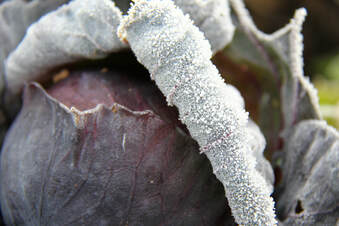
Picture of frosted cabbage by Janet Wallace - note that cabbage can tolerate frost!
Are you wondering how the changes in climate are currently affecting your local food sources?
Here are some things that local growers revealed at last month’s Climate Change Workshop hosted by Foods of the Fundy Valley and Atlantic Canadian Organic Regional Network (ACORN) at Farmer Brown’s Greenhouse.
His words come to mind as we sit as a group and discuss how the changing climate is affecting farming in Albert County. Water was the resonating common factor among the growers present and among stories told about other farmers in the region.
Water issues presented themselves in a variety of ways.
- Wet springs are leaving farmers unable to enter their field, causing crops to be planted late.
- Wet falls and early freezes are making it impossible for farmers to get their crops out of the ground and many crops are ending up frozen in the fields (these will rot over the winter).
- When water doesn’t come for long periods of time, it causes drought; but then it comes all at once and causes erosion, flooding, and drowning of crops and seeds.
Also, late spring frosts are killing seedlings and damaging fruit blossoms.
Farmers also discussed the adaptation methods they are currently implementing and shared ideas of possible methods for the future, including the following:
• Ram pumps: gravity-fed water pumps which do not require electricity or fuel
• Terraced gardens
Permaculture principles: berms and swales
• Implementing more irrigation
• Improving soil health to retain more water
• Use of cover crops
Petitcodiac Watershed Alliance members discussed methods for reducing erosion and implementing riparian zones along coastal and river areas. With the prediction of longer dry periods followed by short periods of high precipitation, this will be a serious and on-going challenge.
If you are facing some of these issues in your backyard garden, community garden plot, small-scale farm or large commercial operation, you are not alone. If you would like to discuss more ideas for climate change adaptation for local growers you can email [email protected]. If you are wondering how the Petitcodiac Watershed Alliance can help coastal or river erosion on your property, go to www.petitcodiacwatershed.org. If you are interested in the new ACORN program Cultivating Climate Resiliency, go to www.acornorganic.org/climatechange.
 RSS Feed
RSS Feed